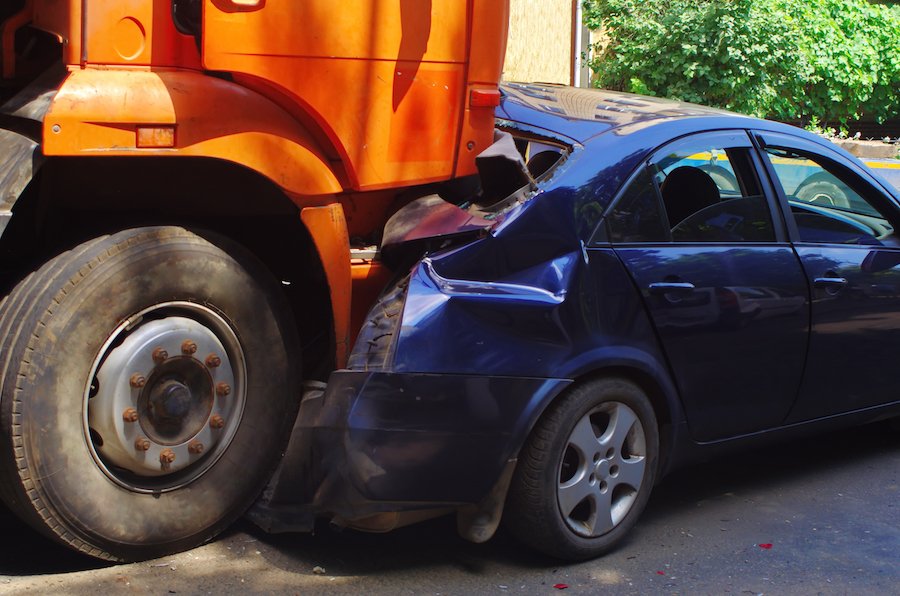Victims of truck crashes may be eligible to file a Nevada trucking accident lawsuit and recover damages for:
- medical bills in Nevada,
- property damage,
- lost wages in Nevada,
- lost earning capacity in Nevada, and/or
- pain and suffering in Nevada
In this article, our Nevada personal injury attorneys discuss how to file a lawsuit for injuries sustained in a trucking accident in Nevada.
- 1. How do I file a lawsuit after a trucking accident in Nevada?
- 2. Whom do I sue?
- 3. How do I prove my claim?
- 4. What damages can I get from a trucking accident lawsuit?
- 5. When should I sue?
- 6. What if I was partly responsible for the truck crash?
- 7. How do defendants fight back?
- 8. What are common causes of truck accidents?
- 9. Truck accident statistics and injuries
Also see our related article on tractor-trailer accidents in Nevada.

Nevada trucking accidents frequently cause fatalities, spinal injuries, brain injuries, and organ damage.
1. How do I file a lawsuit after a trucking accident in Nevada?
The first thing a personal injury attorney would do following a trucking collision is to send a “demand letter” to all the parties responsible for the crash. Ideally, both sides will negotiate a settlement so that litigation can be avoided.
If a settlement cannot be reached, then the personal injury attorney would file a civil lawsuit against the responsible parties (the “defendants”). However, both sides can still continue settlement negotiations.
In fact, the very act of the victim (“plaintiff”) filing a lawsuit often “lights a fire” under the defendants’ insurance company and may prompt a good offer. Meanwhile, the attorneys on both sides would begin the discovery process (“gathering evidence”) and may hold depositions.
If the case goes to trial (which is rare since most cases settle), both sides would present such evidence to the court as:
- medical records
- eyewitness testimony
- testimony from expert witnesses (such as accident reconstruction experts)
- documentary evidence, such as video footage
Finally, the jury would decide whether the plaintiff’s injury lawyers proved “by a preponderance of the evidence” that the defendants were liable for the plaintiff’s injuries. If the plaintiff wins, the court may award him or her Nevada compensatory damages and possibly Nevada punitive damages. However, the defendants may appeal the ruling and delay any payout to the accident victim.
No matter the situation, trucking victims are encouraged to hire experienced Nevada truck accident attorneys as soon as possible after the accident. Personal injury attorneys are skilled at negotiating with insurance companies and fighting them in court. And in practice, insurance companies are far more likely to agree to a better deal when the victim has lawyered up.
2. Whom do I sue?
People who sustained injuries from a trucking accident in Nevada may have grounds to sue such parties as:
- the truck driver (usually a commercial driver)
- the truck driver’s employer (which usually owns the truck itself)
- the truck’s manufacturer (if the truck may have been built incorrectly)1
- mechanics who serviced the truck (if their actions caused it to be defective)
- the state or city government (if subpar road maintenance contributed to the collision)
Some of the biggest trucking companies in the U.S. include Knight-Swift, JB Hunt, XPO Logistics, Schneider National, and Werner Enterprises.
3. How do I prove my claim?
There are various possible claims (“causes of action”) that a crash victim can bring against the defendants depending on the circumstances of the case. Some common ones in Nevada trucking accident law are discussed below.
3.1. Negligence
To prove that a defendant committed negligence in Nevada, the plaintiff would need to show the following:
- the defendant owed the plaintiff a duty of care;
- the defendant breached that duty of care; and
- the defendant’s breach of duty proximately caused the plaintiff’s injuries.2
Truck drivers owe other drivers the duty to drive safely. If a truck driver gets distracted – or suffers from driver fatigue – and consequently causes a crash that injures someone, the truck driver was negligent against the victim.
3.2. Negligence per se
To prove that a defendant committed negligence per se in Nevada, the plaintiff would need to show the following:
- the defendant had the duty to follow a certain law;
- the plaintiff is one of the people that law was designed to protect;
- the defendant violated that law; and
- the defendant’s violation proximately caused the plaintiff’s injuries.3
Truck drivers are required to follow Nevada traffic laws, such as not speeding in Nevada (NRS 484B.600) or driving intoxicated in Nevada. Fellow drivers, passengers, and pedestrians are the people these laws are meant to protect. If a truck driver violates a traffic law and consequently causes a car accident, the truck driver was negligent per se against the victim.
3.3. Respondeat Superior
Even if the big rig driver may have caused the accident, the truck driver’s employer may be liable under the legal claim of respondeat superior in Nevada. In order to prevail on this claim — which is also called “vicarious liability“– the plaintiff would need to show the following:
- The truck driver is employed by the defendant (the trucking company);
- The truck driver was acting in the scope of his or her employment at the time the accident occurred; and
- The truck driver’s actions proximately caused the plaintiff’s injuries.4
Trucking companies have much deeper pockets and larger insurance coverage policies than the drivers they employ. And as long as the trucker was on duty at the time of the accident, there is a good chance the trucker’s employer is liable for the plaintiff’s minor and serious injuries.
3.4. Strict products liability
If the accident occurred due to a defect in the truck, the manufacturer could be held liable for strict products liability in Nevada. The plaintiff would need to show the following:
- The truck was defective as the result of a design, manufacturing, or warning defect;
- The defect existed when the product left the possession of the defendant (the trucking manufacturer);
- The product was used in a manner which was reasonably foreseeable by the defendant; and
- The defect was a cause of the damage or injury to the plaintiff.5
Examples of trucking manufacturers include Mack Trucks (Volvo), Autocar, and Freightliner Trucks (Daimler).
3.5. Wrongful death
If the trucking accident causes someone to die, that victim’s family can file a Nevada wrongful death lawsuit. The plaintiffs (family) would need to prove the following under Nevada law:
- The victim died;
- This death was caused by another’s wrongful act or negligence;
- The plaintiff is an heir or personal representative of the victim; and
- The plaintiff suffered damages for monetary injury as a result of the death6
Note that the victim’s estate can also bring a wrongful death claim.

Common claims in trucking accident lawsuits are negligence and negligence per se.
4. What damages can I get from a trucking accident lawsuit?
People harmed in a trucking collision may seek compensatory damages for their losses. This may include:
- Medical bills (including home health care, rehab, and counseling),
- Lost wages,
- Loss of future earnings
- Pain and suffering,
- Vehicle-repair service bills,
- If the victim died, funeral expenses and loss of support
In the rare event the case goes to trial, the court may also award punitive damages if the defendant(s) acted in an egregious way. Punitive damages can be much larger than compensatory damages, which is why Las Vegas truck accident lawyers fight so hard for them.7
5. When should I sue?
In general, Nevada trucking accident laws allow victims only two (2) years after the victim discovers his/her injury to file a claim.8 Therefore, victims should contact an attorney as soon as possible.
An attorney can get to work right away gathering all the necessary evidence and information in order to commence a legal action before the statute of limitations in Nevada passes. An attorney can also calculate whether special circumstances apply that extend the time limit to file suit.
See our related article, Is there a statute of limitations for truck accidents in Nevada?
6. What if I was partly responsible for the truck crash?
Even if you partially caused a trucking accident, Nevada’s comparative negligence laws may allow you to recover money damages anyway. In Nevada, a defendant can still be held liable as long as the defendant was at least 50% at fault.9
Example: Lily is driving her sedan when Janice loses control of her truck and slams into her. Lily sustains severe injuries.
If the case goes to trial, the court may find that Lily shares responsibility for her injuries because she wore no seat belt. But if the court finds that Janice (or her employer) was at least 50% responsible, Lily should get some money. But the final amount will be reduced in proportion to her percentage of blame.
Predictably, truck accident defendants will always try to blame the victim. That is why an experienced personal injury attorney is necessary to fight back in pursuit of the highest financial settlement possible.
7. How do defendants fight back?
Defendants in trucking accident lawsuits frequently blame-shift their failings onto each other or other parties. Four common defenses they may try are the following:
- The truck driver may argue that the crash was caused by the victim or another person/entity;
- The trucking manufacturer may argue that the truck was in perfect working order when it was purchased;
- The truck driver’s employer may argue that the driver was off duty or acting outside of the scope of work duties when the accident occurred; or
- The city or county may argue that the road where the accident occurred was perfectly maintained
Therefore, the personal injury attorney’s job is to conduct a thorough investigation of the accident in order to dismantle the defendants’ arguments. If the personal injury can make a strong enough case, the defendants may be willing to settle without going to trial.
8. What are common causes of truck accidents?
Driving a truck can be a mentally and physically draining occupation. To keep up with tight deadlines and long hours, truckers often drive for long periods of time on little or no sleep. Operating a massive motor vehicle on little-to-no sleep can obviously create dangerous situations on the road, especially for passenger vehicles.
According to the Federal Motor Carrier Safety Administration (FMCSA), 12% of truck accidents are attributable to driver non-performance. Driver non-performance includes the driver falling asleep, or the driver experiencing a medical event such as a heart attack.
In addition to the physically demanding hours, truck drivers must keep, professional drivers are not immune to the distractions we all face while driving. The advent of mobile technology means that there are more stimuli than ever competing for our attention. Inattentiveness on the part of truck drivers can lead to severe accidents and death.
The same FMCSA study mentioned above confirms this, concluding that driver inattentiveness and distraction was the primary cause of an estimated 28% of truck accidents.
The most common cause of truck accidents is probably not surprising: Like many drivers, truckers succumb to the temptation to exceed the speed limit at one point or another. Compounding the common temptation to speed are tight deadlines and schedules that truck drivers are often forced to keep.
The FMCSA estimates that driver decisions — such as traveling too fast for conditions, misjudging the speed of other vehicles, and following vehicles too closely — are the cause of 38% of truck accidents.10

Plaintiffs in truck accident lawsuits may be able to recover compensatory and punitive damages.
9. Truck accident statistics and injuries
The FMCSA and the National Highway Traffic Safety Administration (NHTSA) report that there were 273,000 accidents involving large trucks in the United States in 2011 alone. Of those 273,000 large truck accidents, 210,000 caused only property damage.
Unfortunately, this means that over 60,000 truck accidents caused more than just property damage. And the FMCSA reports that of those trucking accidents in 2011, 3,757 proved fatal.11
Like any other state, Nevada sees its fair share of truck accidents. According to one FMCSA study, there were 394 fatalities stemming from collisions involving large trucks during the period covering 1999 through 2009 in Nevada alone.12
When a truck collides with a car or motorcycle, the occupants of the truck usually fare much better than the occupants of other vehicles. Typical life-altering injuries from trucking accidents include:
- death
- bone fractures
- damaged organs
- contusions
- disfigurement
- burn injuries in Nevada
- traumatic brain injury in Nevada
- spinal injuries in Nevada
The severity of trucking accident-related injuries is another reason why victims should not go it alone when suing the trucking companies: Victims need all their energy to concentrate on healing so they can rely on their attorneys to concentrate on winning.
Injured in a truck accident in Clark County or elsewhere in Nevada? Call us for help…
If you or someone you know or a loved one has suffered injuries in a trucking vehicle accident in Nevada, our Las Vegas trucking accident attorneys may be able to help. We serve clients and offer legal advice on truck accident cases throughout the state, from Las Vegas to Reno.
Our Las Vegas and Henderson truck accident lawyers offer free consultations and proactive, aggressive representation in traffic accident cases.
To schedule your consultation and find out whether you may be entitled to compensation for your auto accident, fill out the form below or call us.
If you were injured by a truck in California, please see our article on trucking accident claims in California law.
Legal References
- Andrews v. Harley Davidson, Inc., (1990) 106 Nev. 533, 537, 796 P.2d 1092, 1095 (“A manufacturer has a duty to design a reasonably crashworthy vehicle. Huddell v. Levine, 537 F.2d 726, 737 (3d. Cir. 1976). In regard to the crashworthiness of a vehicle, once a court or jury determines that a design defect exists misuse precludes recovery only when the plaintiff misuses the product in a manner in which the defendant could not reasonably foresee. See Hughes v. Magic Chief, Inc., 288 N.W.2d 542, 545 (Iowa 1980). Negligent driving of a vehicle is a foreseeable risk against which a manufacturer is required to take precautions. Ford Motor Co. v. Hill, 404 So.2d 1049, 1052 (Fla. 1981).” ).
- Turner v. Mandalay Sports Entm’t, LLC, (2008) 124 Nev. 213, 180 P.3d 1172; Southern Pac. Co. v. Watkins, (1967) 83 Nev. 471, 435 P.2d 498 (Lexis: “In an action brought as a result of a train-car collision, where a dangerous continuing condition was in issue as the proximate cause of the accident, and other evidence had been admitted of the condition, evidence of prior accidents was permissible.”); see Mikulich v. Carner, (1952) 69 Nev. 50, 240 P.2d 873 (Lexis: “Judgment and order that denied appellants’ motion for a new trial was improper where the testimony of a truck driver regarding the brightness of the bus lights was prejudicial and the jury instructions provided failed to cure any error.”).
- Atkinson v. MGM Grand Hotel, Inc., 98 P.3d 678, 680 (Nev. 2004); Brannan v. Nevada Rock & Sand Co., (1992) 108 Nev. 23, 823 P.2d 291 (Lexis: “Plaintiff alleged negligence by a rock and gravel company for injuries he sustained in a motorcycle-truck collision; evidence of negligent failure to maintain brakes was excluded in error, and jury should have been instructed on negligence per se.”); Mahan v. Hafen, (1960) 76 Nev. 220, 351 P.2d 617 (Lexis: “Whether a truck driver’s negligence in failing to signal a turn was the proximate cause of a rear end collision was a factual matter regardless of whether the negligence arose by violation of a statute or by ordinary negligence.”).
- NRS 41.130; NRS 41.745; Wood v. Safeway, Inc., (2005) 121 Nev. 724, 120 P.3d 1026.
- Valentine v. Pioneer Chlor Alkali, (1993) 109 Nev. 1107, 864 P.2d 295, 297.
- NRS 41.085.
- NRS 42.005.
- NRS 11.190
- NRS 41.141; Karlsen v. Jack, (1964) 80 Nev. 201, 391 P.2d 319 (Lexis: “A truck parked on the side of the road was properly deemed to be the proximate cause of an accident, even though there was an intervening act that contributed to the accident. Therefore, the judgment against the truck owners and employee was proper.”).
- The Large Truck Crash Causation Study – Analysis Brief, Federal Motor Carrier Safety Administration Office of Research and Analysis Publication No. FMCSA-RRA-07-017 (July 2007).
- Large Truck and Bus Crash Facts 2011 – People, Federal Motor Carrier Safety Administration Office of Research and Analysis, FMCSA-RRA-13-049 Analysis Division, Federal Motor Carrier Safety (October 2013).
- Id.

